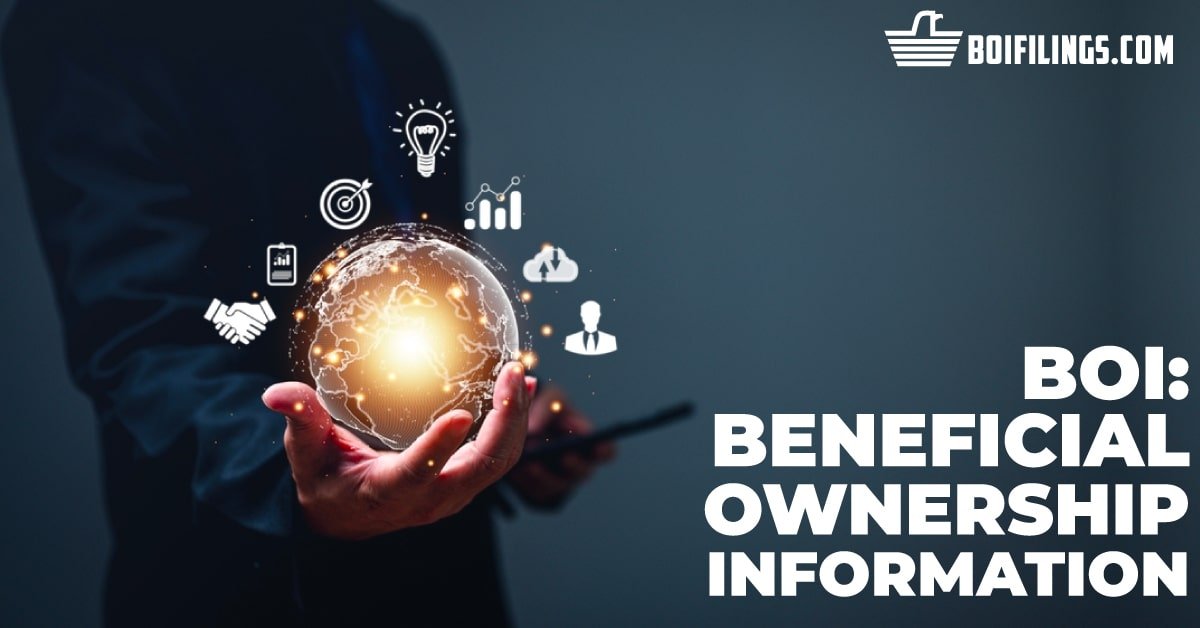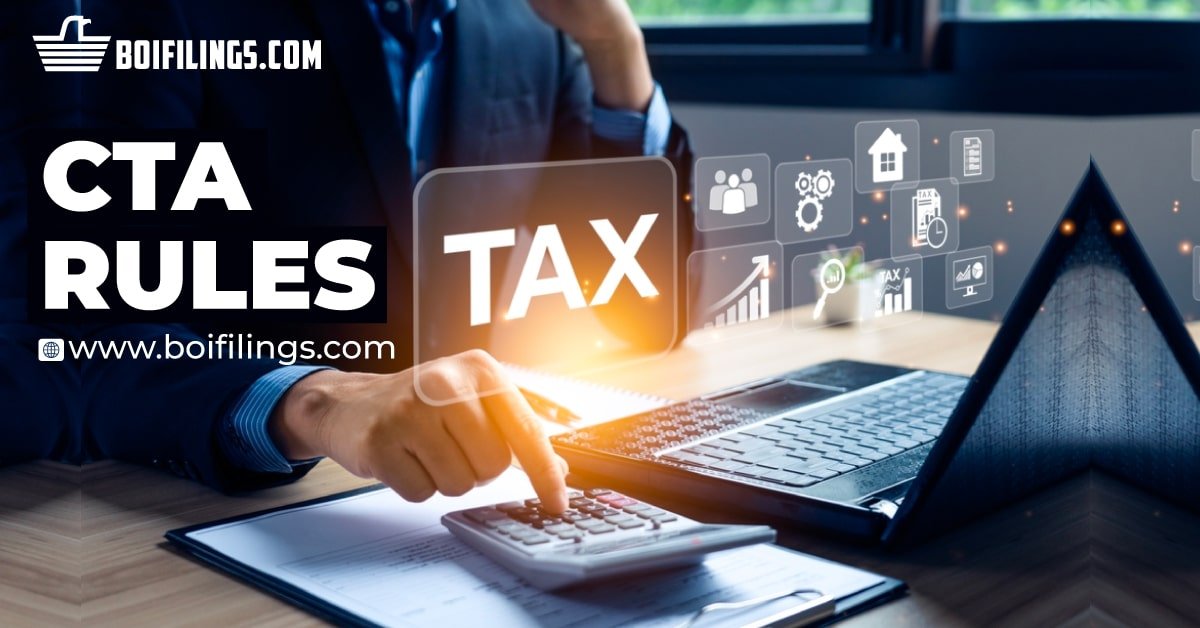In an era where business transparency is not just a luxury but a mandate, understanding the intricacies of Beneficial Ownership Information (BOI) is paramount. Anti-Money Laundering As a business owner, navigating the complexities of regulatory compliance can be daunting. The requirement for clear disclosure of beneficial ownership is just one of many regulations, but its implications for your business can be substantial. In this article, we aim to shed light on the basics of BOI and emphasize its importance in the current business landscape. Learn more about BOI yearly reports.
BOI, Beneficial Ownership Information

What is Beneficial Ownership Information (BOI)?
At its core, Beneficial Ownership Information refers to details about the individuals who ultimately own or control a legal business entity. While a company might have numerous shareholders, not all of them exercise significant control or influence over the company's activities. Those who do – either through their shareholdings, voting rights, or other means – are considered "beneficial owners.”
BOI is not just about identifying major shareholders. It's about understanding the network of control and influence within an organization. This means identifying individuals who might not have direct ownership but exert significant influence through other mechanisms, such as through family connections, contractual agreements, or other indirect means.
Why is BOI Important?
The main reason for gathering and ensuring the accuracy of Beneficial Ownership Information (BOI) is to enhance openness and address unlawful activities like Money Laundering, tax avoidance, and the funding of terrorism. By having a clear understanding of who is behind a company, it becomes harder for individuals to hide behind corporate structures to carry out illicit activities.
For the business owner, ensuring accurate BOI can:
- Demonstrate Compliance: Regulatory bodies are increasingly focusing on the CTA Corporate Transparency Act. Properly maintaining BOI demonstrates to regulators and stakeholders that your business is committed to high standards of accountability and transparency.
- Build Trust: With growing scrutiny from the public and stakeholders on corporate structures and operations, providing clear BOI can bolster your company's reputation and build trust with clients, partners, and investors.
- Avoid Penalties: Failure to adhere to beneficial ownership regulations may result in substantial fines and penalties, in addition to potential damage to one's reputation due to the perception of opacity or dishonesty.
How is BOI Collected and Updated?
BOI collection begins at the time of company incorporation or the formation of a legal entity. Business owners are typically required to provide information on all What is an Entity Beneficial Owner for an LLC? who have significant control or influence over the business.
It's worth noting that beneficial ownership is not static. As a business evolves – with shares being bought or sold, new partnerships formed, or changes in management structures – the roster of beneficial owners can change. Know about Beneficial Owner. As such, businesses are required to regularly update their BOI to reflect the current state of ownership and control.
What Challenges Might Businesses Face?
While the concept of BOI might seem straightforward, its implementation can be rife with challenges. For starters, determining who qualifies as a "beneficial owner" can be ambiguous, especially in complex corporate structures with multiple layers of ownership.
Furthermore, maintaining updated BOI can be an administrative burden, particularly for businesses with frequently changing ownership structures or those operating in multiple jurisdictions with varying BOI requirements. What is the FATF report?
Lastly, concerns about privacy can arise, especially when providing detailed personal information about individuals. Striking a balance between regulatory compliance and respecting individual privacy rights is crucial.
How Can BOI Filings Assist?
Navigating the BOI landscape doesn't have to be a solo endeavor. BOI Filings, a third-party organization, is standing by to help business owners like you. Our expertise lies in:
- Comprehensive Filing: We can assist in ensuring that all necessary documents related to BOI are accurately filed with the government, taking the guesswork out of the equation for you.
- Staying Updated: With changing regulations and business structures, it's easy to fall behind. What is Ultimate Beneficial Ownership? We can help ensure your BOI remains up-to-date, reflecting the latest changes in ownership or control.
- Peace of Mind: With BOI Filings handling your beneficial ownership information, you can have the confidence that your business remains compliant, potentially avoiding massive fines and penalties.
How Does FinCEN Affect Beneficial Ownership Information Reporting?
The Financial Crimes Enforcement Network (FinCEN), a division of the U.S. Department of the Treasury, holds a central role in influencing the rules governing beneficial ownership. want to know What is the NSBA. FinCEN's primary objective is to protect the financial system from unlawful activities, counter money laundering, and enhance national security by gathering, analyzing, and sharing financial intelligence.
For businesses, the regulations established by FinCEN have significant implications for the reporting of Beneficial Ownership Information (BOI). As part of its mission to enhance transparency and combat FATF - Financial Action Task Force, FinCEN has established mandates for financial institutions to identify and authenticate the beneficial owners of their legal entity customers.
Frequently Asked Questions
- What Are the New Reporting Requirements?
Recent changes have expanded the scope of entities required to report Beneficial Ownership. Now, not only banks but a broader range of financial institutions and even certain non-financial businesses might be obligated to gather and report BOI.
Moreover, the threshold for what constitutes 'significant control' or 'ownership' might vary, mandating businesses to report individuals with lower percentages of ownership than before.
- Can Your Organization File My BOI Report?
Absolutely. At BOI Filings, we specialize in navigating the maze of beneficial ownership reporting. Corporate Transparency Act 2023 Our team stays updated with the latest FinCEN guidelines and can help ensure that your business's BOI report aligns perfectly with current requirements.
The FinCEN Connection
As FinCEN's directives evolve, businesses must remain agile in their approach to BOI reporting. Financial Action Task Force The rationale behind FinCEN's regulations is clear – by casting a wider net and demanding greater transparency, the U.S. financial system becomes more resilient against illicit activities.
However, the on-ground reality for businesses, especially small and medium-sized enterprises, can be challenging. The administrative burden of constant updates, changing thresholds, and the need to report for multiple jurisdictions can be daunting.
That's where the expertise of organizations like BOI Filings comes into play. Know What is AML. With a comprehensive understanding of FinCEN's directives and the challenges businesses face, we offer a streamlined approach to BOI reporting.
Navigating the Future
Beneficial ownership information reporting, guided by FinCEN's regulations, is not a transient requirement but an evolving landscape. Anti-money laundering compliance. As global financial dynamics shift and the need for transparency grows, businesses can expect further refinements in BOI directives.
For business owners, this underscores the importance of having a reliable partner to navigate the BOI terrain. BOI Filings not only ensures compliance but also offers businesses the peace of mind to focus on their core competencies, knowing that their BOI obligations are in safe hands.
Who Can View the BOI Information My Business Reports?
The collection of Beneficial Ownership Information (BOI) serves the vital function of promoting transparency and deterring illicit activities. However, this also brings forth legitimate concerns about who gets access to this data. Beneficial Owner for an LLC. Typically, the BOI information you report is accessible to:
- Regulatory Authorities: FinCEN and other regulatory bodies have primary access to the data to ensure compliance and to monitor for suspicious activities.
- Financial Institutions: When you engage with banks and other financial institutions, they may be required to verify the beneficial ownership details of your business to meet their own compliance obligations.
- Law Enforcement: In the event of investigations or legal proceedings, law enforcement agencies might access BOI data.
However, it's essential to note that while the information is accessible to specific entities for regulatory or legal purposes, it is not made public. Beneficial Ownership Information reporting requirements Protocols are in place to ensure that the data remains confidential, protecting both the interests of the businesses and the privacy of the individuals listed.
How Does Beneficial Ownership Reporting Affect US Small Businesses?
For US small businesses, the realm of beneficial ownership reporting can be especially challenging. Here’s how:
- Administrative Burden: Smaller entities might not have dedicated compliance teams. This means the responsibility often falls upon the business owners or a limited staff, which can be overwhelming.
- Cost Implications: Ensuring compliance often necessitates investing in resources, training, or external services. For small businesses operating on thin margins, these costs can be significant. Beneficial Ownership Secure System
- Complexity in Business Structures: Small doesn't necessarily mean simple. Some small businesses have intricate ownership structures, making it challenging to determine and report beneficial owners accurately.
- Potential for Oversights: Without the right expertise, small businesses may inadvertently overlook certain reporting requirements, putting them at risk for penalties.
However, it's also essential to highlight the advantages. Do you want to know NSBA, The National Small Business Association? Through compliance with beneficial ownership reporting, small businesses can showcase their dedication to transparency and responsibility, which could potentially enhance trust among stakeholders and financial institutions.
Our Organization is Standing By to Take Care of All Your Filing Needs
Understanding the complexities and staying compliant with beneficial ownership information can be a daunting task. This is where BOI Filings comes to the forefront.
- Expertise at Your Service: Our team, with its profound knowledge of the BOI landscape, is adept at handling all facets of filing – from data collection to submission.
- Customized Solutions: Acknowledging the individuality of each business, we customize our services to align with your distinct requirements, ensuring a seamless and personalized experience for you. Customer Due Diligence for Business Owners.
- Cost-Efficient Compliance: With BOI Filings by your side, you can achieve compliance without the need to invest heavily in internal resources or training. We offer an effective and budget-friendly alternative to navigating the BOI complexities on your own.
- Updated Protocols: Regulatory landscapes evolve, and with them, the requirements. Our team stays abreast of all changes so that your business can remain compliant at all times.
In essence, BOI Filings is not just a service provider but a partner. We are dedicated to your business having the ability to traverse the intricate domain of Beneficial Ownership Information with ease and confidence. With us standing by, you can rest assured that your filing needs are managed professionally, leaving you to focus on what you do best – growing your business.
In Conclusion
Understanding and maintaining accurate Beneficial Ownership Information is more than just a regulatory requirement—it's a commitment to transparency, accountability, and good business practice. As the regulatory landscape continues to evolve, ensuring compliance will become even more crucial. PIL Personally Identifiable Information. With organizations like BOI Filings ready to assist, business owners have the tools and resources they need to navigate the BOI terrain confidently and effectively. Beneficial Ownership Information. Making the right choices today can safeguard your business's reputation and financial health for years to come.
File a Required BOI
In the evolving landscape of business regulations, staying compliant is more than a mere legal formality; it's now a cornerstone of ethical and responsible entrepreneurship to file a required BOI.
Read More
CTA Rules
Let's go over CTA code of ethics rules that go into effect on January 1, 2024 (Corporate Transparency Act) for US businesses via BOI filing (Beneficial Ownership Information) with FinCEN: Learn here CTAs and NFA regulations.
Read MoreEXPLORE RELATED TOPICS
BOI REPORT WHAT IS A BOI BOI LLC Ruling WHAT IS THE BENEFICIAL OWNERSHIP REPORT BENEFICIAL OWNER 2024